The 2020 Toyota Avalon isn’t the sleepy sedan you may think it is, and that's a good thing. Despite its long reputation as a nap-worthy vehicle, the styling isn’t exactly sleep-inducing anymore and the driving experience is far more involving. Heck, Toyota is even letting the Avalon's hair down with the addition of a sport-tuned TRD model for 2020. We’re not sure who's asking for it, but hey, why not? It only adds to the existing variety of Avalon models, including those powered by V6 and hybrid powertrains, which is good since there are now so few full-size sedans available for those who want something bigger and more luxurious than the Camrys of the world. There's the Chevrolet Impala (dead soon), Chrysler 300 (possibly following soon thereafter), Kia Cadenza (did you even know it existed?) and that's pretty much it.
Even if it had more competitors, though, we're confident that the well-rounded Avalon would still be one of the best choices. Its redesign for the 2019 model year made it fresh and modern in all the right ways, especially in light of its tired competition. It's even luxurious enough to be considered a legitimate alternative to luxury sedans like the mechanically related Lexus ES.
What’s new for 2020?
The only change worth noting is the addition of the sport-tuned Avalon TRD. This model (against all common sense) is the Avalon for someone who wants to use it as a lean and mean handling machine. Toyota added robust underbody bracing, firmer shocks and springs, stiffer anti-roll bars, larger brakes, lighter wheels and a loud TRD cat-back exhaust. All this (plus a comprehensive appearance overhaul) costs $43,255.
It has been announced that the Avalon will gain an all-wheel drive option paired to a 205-horsepower four-cylinder in 2021. We expect to that model in showrooms come fall 2020.
What’s the interior and in-car technology like?
The Avalon's full redesign last year brought a significantly improved interior – impressive given the old one was arguably of a higher quality than every competitor. The old design also looked quite a bit like the new Camry's, but the current version goes its own way with a tall, rectilinear center stack that rises forth from the center console and seems to hover away from the rest of the dash like a free-standing tower. It's kinda cool and avoids the tacked-on iPad look many dislike, while still benefiting from the reduced visual bulk and elevated sightline that design allows. The area behind it is architectural in appearance, neatly integrates the air vents, and showcases different materials. Perhaps there's a bit too much going on, though, especially in the Touring's Cognac cabin, and the tower's "supports" are an unconvincing hard plastic knock-off of the squishy dashtop above.
Wide, expansive seats are comfortable to sit on for long periods of time, and the driving position is perfect for eating up highway miles with ease. Visibility is fantastic with no major negatives to make note of. Heated and cooled seats are available depending on which trim you opt for, as is a heated steering wheel.
The aforementioned center tower itself features unique-to-Avalon switchgear that maintains Toyota's long standing preference for keeping the climate control system separate from the infotainment (kudos). The latest Toyota Entune 3.0 system comes standard with a 9-inch touchscreen, WiFi, five USB ports, satellite radio, Amazon Alexa integration and Apple CarPlay. The company said it will add Android Auto should customers demand it, but that hasn’t happened yet. Toyota still hasn’t hopped onboard the fully digital gauge cluster game with the Avalon, but it does have a generous 7-inch display that splits the gauge set.
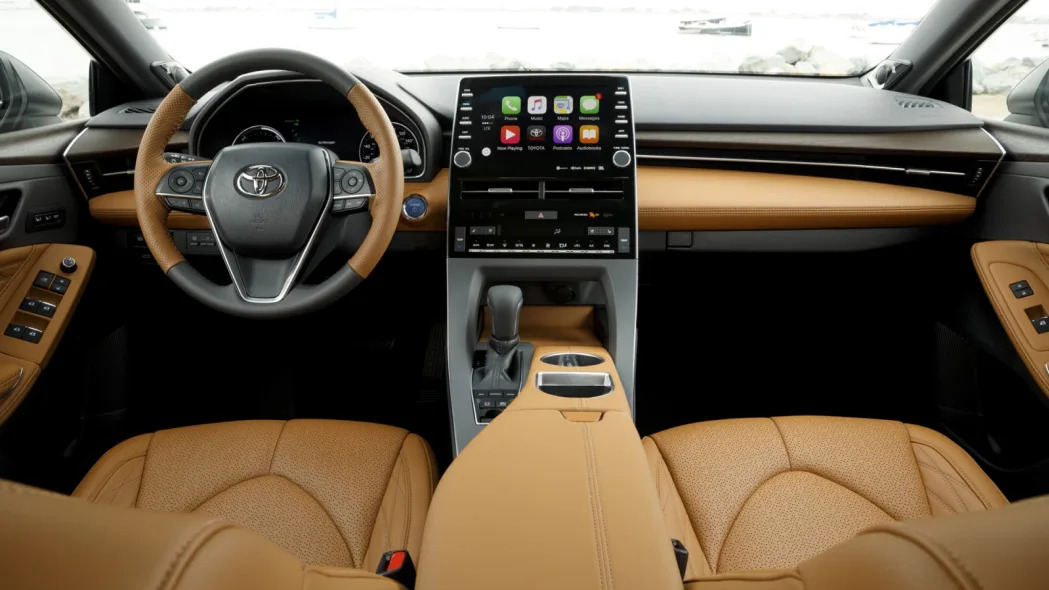
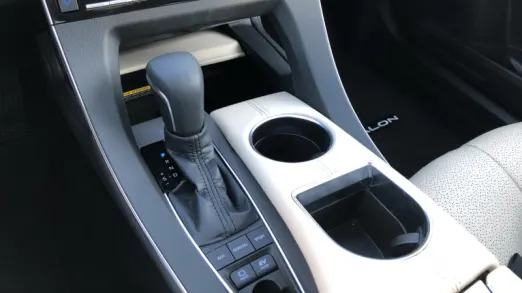

How big is it?
The 2020 Toyota Avalon is a large one. It’s big, and that’s one of the reasons it succeeds. At 195.9 inches in length, it’s actually longer than the three-row Highlander. With the length comes an attractive, long hood and a true presence on the road. Passengers in back can spread out with 40.3 inches of legroom, and the trunk has a sizable 16 cu-ft of cargo space. That's good for the segment, but there’s no denying that a crossover will be capable of providing more cargo space.
There’s just as much space for your stuff with the Avalon Hybrid, as the cargo volume figure sticks to 16 cu-ft. Past hybrid sedans always lost trunk space because of the battery pack. Good job, Toyota. The trunk shape is useful, too, making it easy to get larger suitcases and bags into the rear.
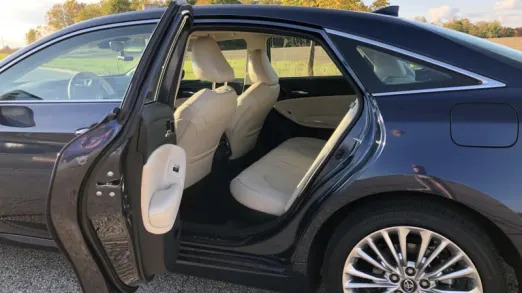

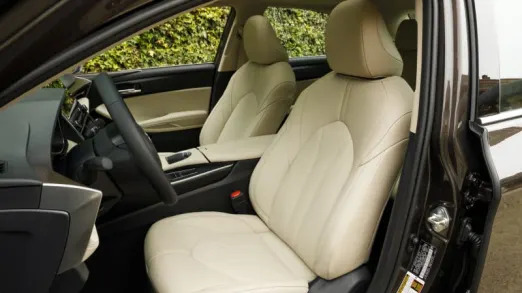
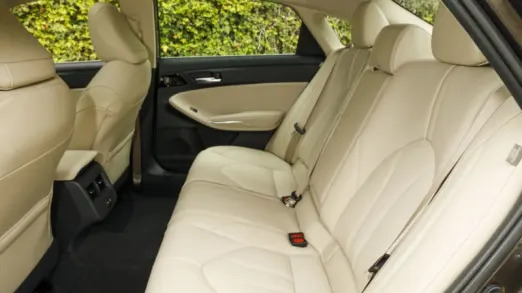
What’s the performance and fuel economy?
The 2020 Toyota Avalon comes standard with a 3.5-liter V6, an eight-speed automatic transmission and front-wheel drive. This engine produces 301 horsepower and 267 pound-feet of torque. Fuel economy for the XLE trim is 26 mpg combined, whereas the XSE, Limited, TRD and Touring trims all earn 25 mpg combined ratings.
The Avalon Hybrid powertrain consists of a 2.5-liter four-cylinder and a pair of electric motors. The combined system output is 215 horsepower, but it feels a bit stronger than the numbers suggest. Fuel economy is sensational for a full-size sedan (or any, for that matter), as the XLE trim accomplishes 44 mpg combined — the XSE and Limited are both rated for 43 mpg combined.
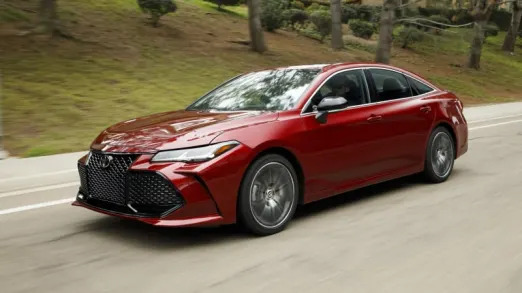
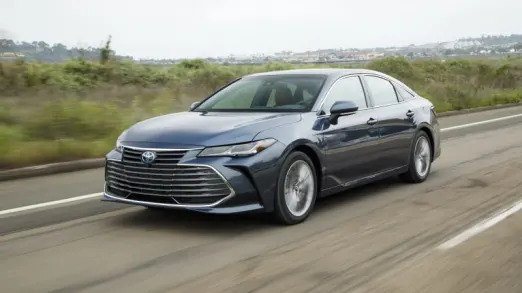
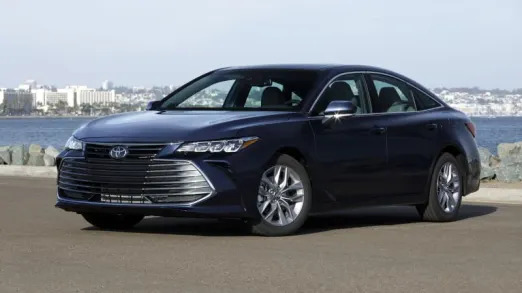
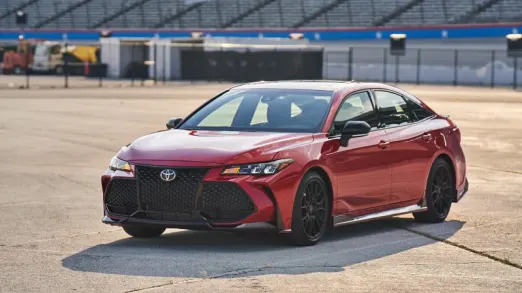
What’s it like to drive?
Each of the four trim levels has different tuning of the MacPherson strut front and multi-link rear suspension. Handling precision was improved for the XLE and Limited, but comfort remains the priority, and the suspension setup yields a softer ride. It's still supple as always, but now body motions are kept nicely in check.
The Limited's springs are 25-percent stiffer than those of the XLE, while stabilizer bar stiffness increases by 20 percent front and 86 percent rear when going from XLE to XSE. It's a difference you can immediately feel when driving the XSE, which has a more solid, hunkered down feel than both the premium Avalon trims and other full-size sedans. Indeed, every Avalon impresses with its steering's precision and natural effort. The latter is actually a little heavier than expected – a pleasant surprise for some, perhaps a concern for the arthritic crowd – but still fine at lower speeds. Like the rest of the Avalon driving experience, especially with the sport trims, it feels like it belongs to a normal, involving car instead of an aloof isolation machine. In fact, selecting the car's Sport mode only slightly increases effort to the point that it's only noticeable when really pushing hard.
And if you're going to be really pushing hard, the new Avalon TRD offers a big step up in terms of agility. We drove a TRD back-to-back with an Avalon Touring on a cone-filled autocross, and the ultra-sport version makes the regular one feel like piloting a Ford LTD in a 1970s cop show. Crank the wheel in the standard Avalon, and you wait, wait, wait for the car to come screeching around the corner, heeled over on its outside front tire. The Avalon TRD, by contrast, still feels like a big car, but it’s a big car that responds. That could be great for a select crowd, but it also lacks the Touring's adaptive suspension dampers and generally supple ride quality.
Really, it's the Avalon Hybrid that's likely to be the best choice for most buyers. It’s a smooth operator that doesn’t feel down on power despite the numbers. The engine gets slightly buzzy when you really get on it, but your acceleration forward is rapid enough to not be annoyed at the noise. Handling is solid and the battery's location under the back seat actually improves the car's balance, but that's certainly not enough to move the "fun-to-drive" meter passed what you'd get in the Touring, let alone the TRD.
What more can I read about the Toyota Avalon?
2019 Toyota Avalon First Drive Review: A new hope
Read all about our first impressions of the completely redesigned Toyota Avalon here
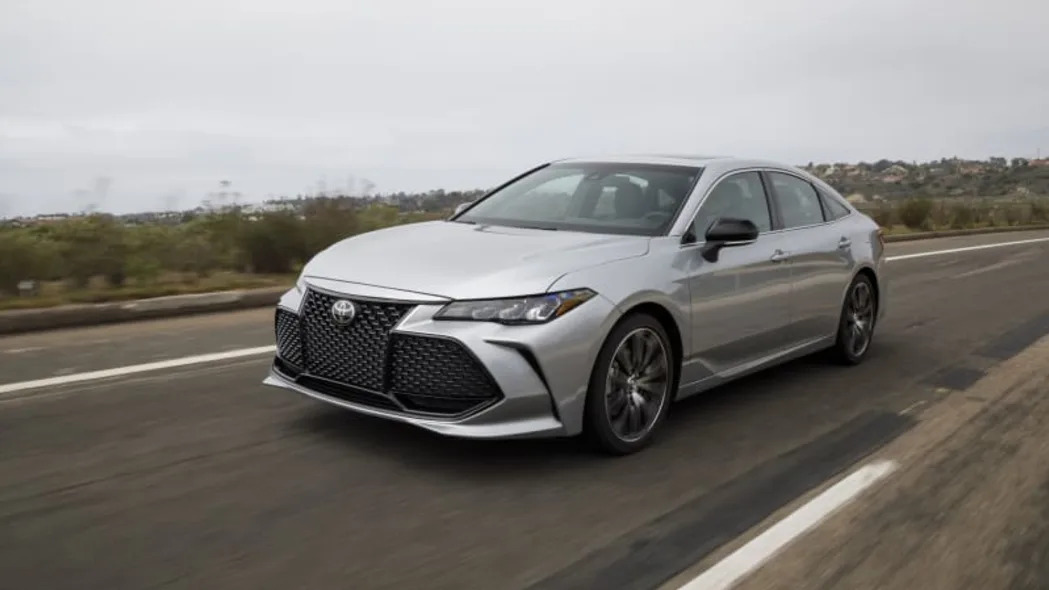
2020 Toyota Avalon TRD First Drive Review | Grandpa's got a hot date
Don't ask why. Toyota made a TRD version of the Avalon, and we drove it like a sports car.
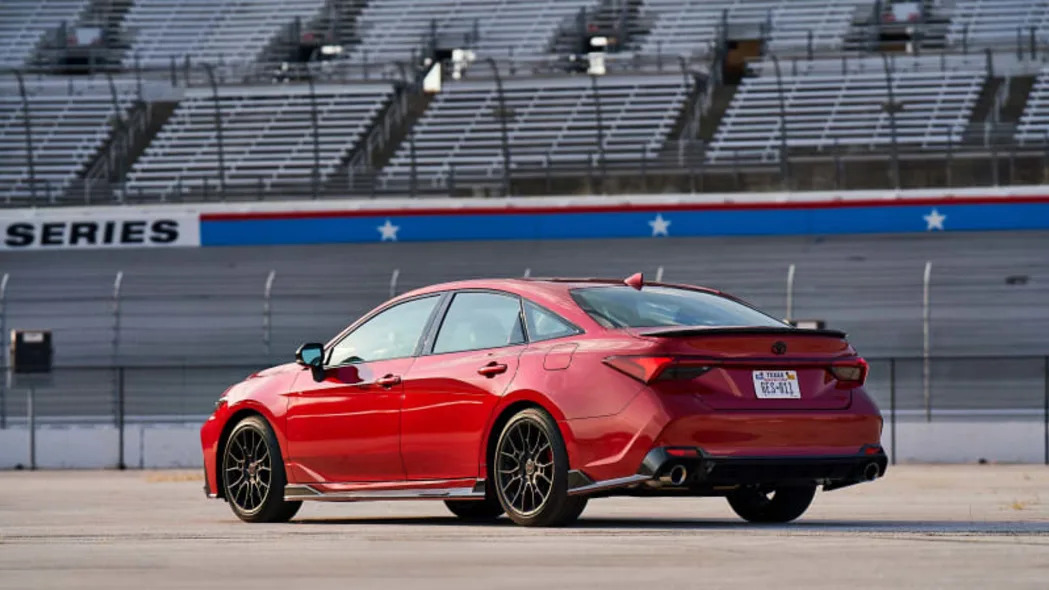
2019 Toyota Avalon vs. full-size sedans: How they compare on paper
There aren't many full-size sedans left, but you can see how the Avalon compares to its contemporaries here.
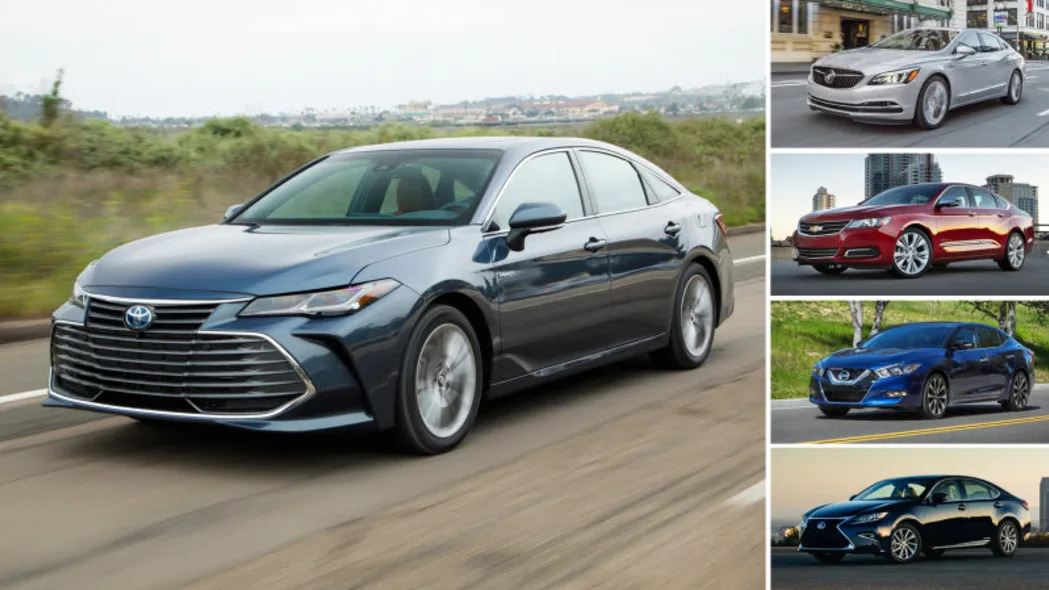
What features are available and what’s the price?
Pricing for the 2020 Toyota Avalon starts at $36,755, including the $955 destination charge. The base price stretches all the way up to $44,105 for a Hybrid Limited, so it never reaches stratospheric levels.
The base Avalon includes standard equipment like LED headlights and taillights, heated mirrors, 17-inch alloy wheels, proximity entry and push-button start, leather steering wheel, auto-dimming rear-view mirror, four USB charge ports, dual-zone automatic climate control and the 9-inch touchscreen.
For a full breakdown of features, specs and local pricing for each 2020 Avalon trim level, check out this page here on Autoblog.
- XLE: $36,755
- XSE: $39,255
- TRD: $43,255
- Limited: $43,055
- Touring: $43,455
- Hybrid XLE: $37,805
- Hybrid XSE: $40,305
- Hybrid Limited: $44,105
What are its safety equipment and crash ratings?
All Avalons come standard with Toyota’s suite of safety and driver assistance systems. This includes forward collision warning with pedestrian detection and automatic emergency braking, lane-departure warning, lane-keeping assist, blind-spot warning, rear cross-traffic warning, adaptive cruise control, and automatic high beams. The Limited can be equipped with rear cross-traffic emergency braking.
The Toyota Avalon received a Top Safety Pick+ award from the Insurance Institute for Highway Safety, but the award is headlight dependent. Its standard LED reflector lights received a “Poor” rating, whereas the LED projectors got the highest “Good” rating from the IIHS. That means the rating only applies to the Limited, Touring and Hybrid Limited trims. All versions of the car crashed commendably, receiving the highest possible scores in crashworthiness and accident avoidance. The Avalon also scored a five-star rating from government, performing well in all of its crash tests. Some of the specific tests (front driver, passenger side and rollover tests) returned four-star ratings, but every other crash scenario scored a perfect five stars.


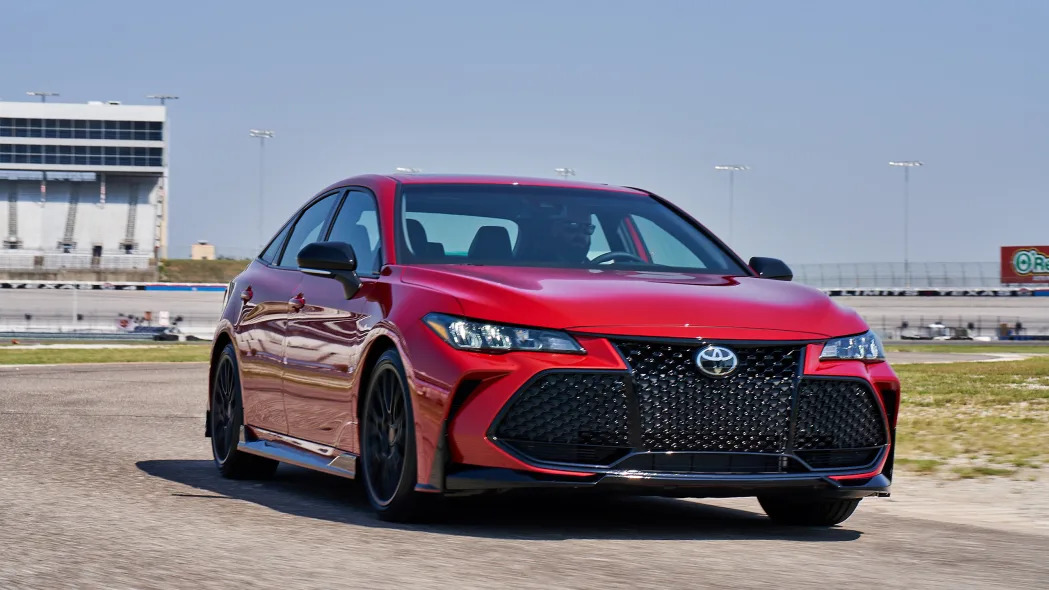









Sign in to post
Please sign in to leave a comment.
Continue